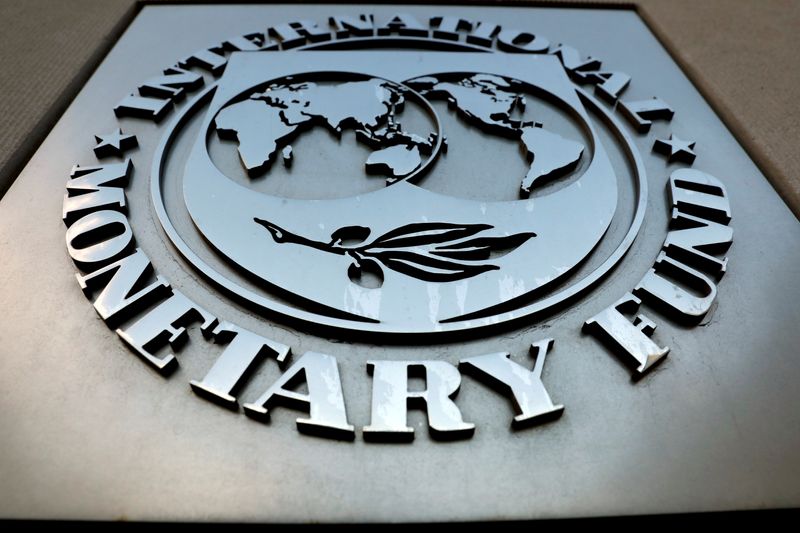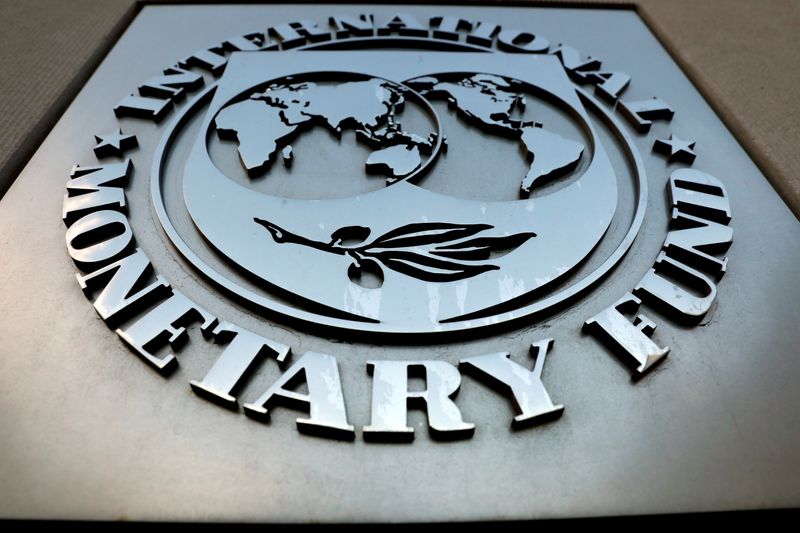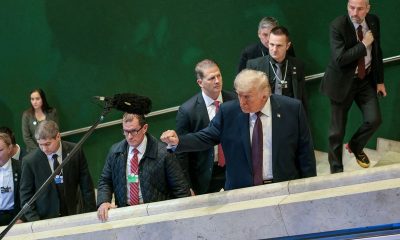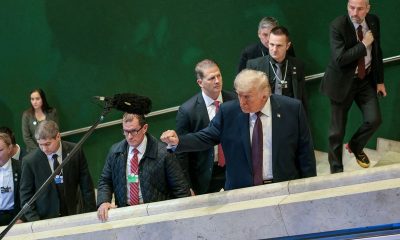Economy
Pakistan’s Imran Khan expresses support for bailout deal in IMF meeting


© Reuters. FILE PHOTO: The International Monetary Fund (IMF) logo is seen outside the headquarters building in Washington, U.S., September 4, 2018. REUTERS/Yuri Gripas/File Photo
By Gibran Naiyyar Peshimam
KARACHI, Pakistan (Reuters) -Pakistan’s main opposition leader and former prime minister Imran Khan expressed support for a recently-reached bailout deal with the International Monetary Fund (IMF) after a meeting with officials of the lender on Friday, his party said.
The IMF said it was, in the lead up to national elections in the autumn, seeking the support of Pakistan’s political parties, including Khan’s, for the new nine-month $3 billion stand-by arrangement and policies associated with the programme.
Hammad Azhar, a former finance minister under Khan, who attended the meeting virtually, said in a post on Twitter that the former premier and his economic team had discussed last week’s staff-level deal between the IMF and Pakistan’s government.
“In this context we support the overall objectives and key policies,” Azhar said, adding the meeting at Khan’s residence in the eastern city of Lahore was attended in person by IMF officials while Mission Chief Nathan Porter joined virtually.
Earlier, the IMF’s resident representative Esther Perez Ruiz said in a statement that the meetings with political parties were to “seek assurances of their support for the key objectives and policies under a new IMF-supported program ahead of the approaching national elections.”
The new deal, which will be vital to help stabilise Pakistan’s struggling $350 billion economy, will be taken up for approval by the IMF board on July 12.
The programme looks to replace a four-year Extended Financing Facility programme, originally signed by Khan’s government in 2019, and which expired last month.
Khan’s government deviated from agreements under an earlier IMF programme days before he was ousted in a parliamentary vote last year, leading to a delay in the implementation of the programme and increased economic uncertainty.
Pakistan’s national elections are scheduled to be held by early November amid a charged political atmosphere that has seen Khan, the country’s main opposition leader, in a bruising standoff with the government and the powerful military.
‘POLITICAL STABILITY KEY’
The new programme will span three governments – the incumbent set up under Prime Minister Shehbaz Sharif, whose term ends in August, a caretaker administration that will conduct the polls, and then a new government following the elections.
Azhar said the Pakistan Tehreek-e-Insaaf (PTI) party believed political stability was key for the economy and called for “free, fair and timely” elections after which a new government would initiate reforms and engage on a longer-term basis with multilateral institutions.
Despite being the country’s most popular leader according to polls, Khan faces the prospect of being disqualified from the elections if found guilty in any of the cases against him since his removal from power.
The meeting is the highest profile engagement for Khan and his the PTI since he was ousted from power less than four years into his five-year term.
He said the cases are a bid to sideline him and dismantle his party before the polls. The government and military deny this, and say the cases are on merit.
The government launched a country-wide crackdown on the party in the aftermath of violent protests that followed Khan’s brief arrest in May. The protests saw military installations ransacked. Khan was later released on bail.
Many of Khan’s key aides remain under arrest and many others, like Azhar, are in hiding. Azhar said some of PTI’s economic team members attended the meeting virtually.
Economy
Russian central bank says it needs months to make sure CPI falling before rate cuts -RBC


© Reuters. Russian Central Bank Governor Elvira Nabiullina attends a news conference in Moscow, Russia June 14, 2019. REUTERS/Shamil Zhumatov/File Photo
MOSCOW (Reuters) – Russia’s central bank will need two to three months to make sure that inflation is steadily declining before taking any decision on interest rate cuts, the bank’s governor Elvira Nabiullina told RBC media on Sunday.
The central bank raised its key interest rate by 100 basis points to 16% earlier in December, hiking for the fifth consecutive meeting in response to stubborn inflation, and suggested that its tightening cycle was nearly over.
Nabiullina said it was not yet clear when exactly the regulator would start cutting rates, however.
“We really need to make sure that inflation is steadily decreasing, that these are not one-off factors that can affect the rate of price growth in a particular month,” she said.
Nabiullina said the bank was taking into account a wide range of indicators but primarily those that “characterize the stability of inflation”.
“This will take two or three months or more – it depends on how much the wide range of indicators that characterize sustainable inflation declines,” she said.
The bank will next convene to set its benchmark rate on Feb. 16.
The governor also said the bank should have started monetary policy tightening earlier than in July, when it embarked on the rate-hiking cycle.
Economy
China identifies second set of projects in $140 billion spending plan


© Reuters. FILE PHOTO: Workers walk past an under-construction area with completed office towers in the background, in Shenzhen’s Qianhai new district, Guangdong province, China August 25, 2023. REUTERS/David Kirton/File Photo
SHANGHAI (Reuters) – China’s top planning body said on Saturday it had identified a second batch of public investment projects, including flood control and disaster relief programmes, under a bond issuance and investment plan announced in October to boost the economy.
With the latest tranche, China has now earmarked more than 800 billion yuan of its 1 trillion yuan ($140 billion) in additional government bond issuance in the fourth quarter, as it focuses on fiscal steps to shore up the flagging economy.
The National Development and Reform Commission (NDRC) said in a statement on Saturday it had identified 9,600 projects with planned investment of more than 560 billion yuan.
China’s economy, the world’s second largest, is struggling to regain its footing post-COVID-19 as policymakers grapple with tepid consumer demand, weak exports, falling foreign investment and a deepening real estate crisis.
The 1 trillion yuan in additional bond issuance will widen China’s 2023 budget deficit ratio to around 3.8 percent from 3 percent, the state-run Xinhua news agency has said.
“Construction of the projects will improve China’s flood control system, emergency response mechanism and disaster relief capabilities, and better protect people’s lives and property, so it is very significant,” the NDRC said.
The agency said it will coordinate with other government bodies to make sure that funds are allocated speedily for investment and that high standards of quality are maintained in project construction.
($1 = 7.1315 renminbi)
Economy
Russian central bank says it needs months to make sure CPI falling before rate cuts -RBC


© Reuters. Russian Central Bank Governor Elvira Nabiullina attends a news conference in Moscow, Russia June 14, 2019. REUTERS/Shamil Zhumatov/File Photo
MOSCOW (Reuters) – Russia’s central bank will need two to three months to make sure that inflation is steadily declining before taking any decision on interest rate cuts, the bank’s governor Elvira Nabiullina told RBC media on Sunday.
The central bank raised its key interest rate by 100 basis points to 16% earlier in December, hiking for the fifth consecutive meeting in response to stubborn inflation, and suggested that its tightening cycle was nearly over.
Nabiullina said it was not yet clear when exactly the regulator would start cutting rates, however.
“We really need to make sure that inflation is steadily decreasing, that these are not one-off factors that can affect the rate of price growth in a particular month,” she said.
Nabiullina said the bank was taking into account a wide range of indicators but primarily those that “characterize the stability of inflation”.
“This will take two or three months or more – it depends on how much the wide range of indicators that characterize sustainable inflation declines,” she said.
The bank will next convene to set its benchmark rate on Feb. 16.
The governor also said the bank should have started monetary policy tightening earlier than in July, when it embarked on the rate-hiking cycle.

 Forex4 years ago
Forex4 years agoForex Today: the dollar is gaining strength amid gloomy sentiment at the start of the Fed’s week

 Forex3 years ago
Forex3 years agoUnbiased review of Pocket Option broker

 Forex3 years ago
Forex3 years agoDollar to pound sterling exchange rate today: Pound plummeted to its lowest since 1985

 Forex3 years ago
Forex3 years agoHow is the Australian dollar doing today?

 Cryptocurrency3 years ago
Cryptocurrency3 years agoWhat happened in the crypto market – current events today

 World3 years ago
World3 years agoWhy are modern video games an art form?

 Commodities3 years ago
Commodities3 years agoCopper continues to fall in price on expectations of lower demand in China

 Economy3 years ago
Economy3 years agoCrude oil tankers double in price due to EU anti-Russian sanctions

























